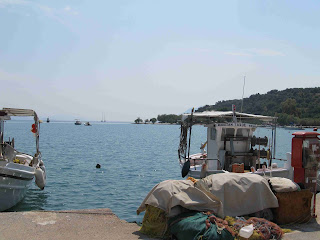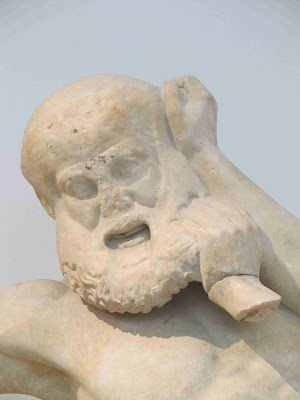Morocco is an incredibly diverse country both geographically and ethnically with Berbers occupying the east and south and the more Arabic/Islamic culture occupying the north and west.
Morocco is in a different time zone from Spain measured in both centuries and hours and that adds to the interest. As our muslim guide in Fes said, the berbers tolerate the Arabs (muslims) and go their own way. The principal language is Arabic with French as a 2nd language. Rarely do you find English speaking Moroccans.
Morocco is for experienced travellers and a very nimble motorcycle is necessary to navigate the roads, passes, and dirt. We hardly saw another moto except a Vstrom 650 -2up ,a few GS’s and the Kawasaki KLR600’s, a few new Yamaha 660XT’s and a couple of Africa Twins which Sandra refers to as Africa Queens. Too much Bogart I think. A Hamburg based R 1200RT was at the ferry terminal but they drove the motorways to Marrakesh and back, the easy stuff. Scooters are everywhere and ½ of the riders are bent over at the side of the road re-attaching their chain. It is a national sport! And on every street there has to be 2 -3 shops with broken down scooters at them. Old Mercedes are everywhere as well in diesel format, as Grand Taxis. Dacia’s are the Petit Taxis. 2-3 shops per street as well.
Riding in Morocco is a guerrilla survival technique of driving and it is seldom that you ride for fun since oil, sand, debris, people, animals or a vehicle will appear out of nowhere. Line markings mean nothing. In fact after we posted the Dades gorge video we found online another video we have created a link to. It shows all the driving mistakes that drivers regularly make including the ‘professional’ bus driver. It is hilarious and deadly accurate. Watch it. It can be found in the right hand menu.
The country is very mountainous with the Riff mountains covering the east and north, and the range of Mid Altas, High Altas and Anti Altas mountains covering the middle, mid south and south part of the country respectively. Dades gorge is in the mid to high Altas on the east side of the pass. The Ticht au Tizha pass that we went over west of Ouarazazate was likely 120kms in length with 80 kms of it in hairpin turns as difficult as the ones you saw in the Dades article and video. Riding it was scenic but exhausting. I will enjoy the riding videos more when home since I can recall the route but know I won’t get hit. We were warned to stay out of the Riff mountain area but at no time did we feel at risk when there; even though there apparently is a drug trade going on.
If you missed it the Dades gorge video is here.
https://youtu.be/O9Qra3fxg2o?si=AupE9KSU9wA66d0V
Sandra has the following reminder when these signs appear….. 80>>>>60>>>>40>>>>20>>>POLICE.
In virtually every situation you see a set of reducing speed signs in place like this you will find the police. In nearly every town Police are there to control traffic on one end of town. They do not seem to be interested in tourists though.
Tourists go through the rigor of having to complete a daily travel diary at each hotel they stay at, where they are coming from and where they are going to and including their temporary entry visa number on each one.
We love the Berber people who are so genuine and hard working. We are concerned with the high unemployment that has many people laying in fields, ditches, or sitting at the side of the road with nothing to do. At 50% unemployment this place may be the next to erupt. Poverty is everywhere. Men sit together in cafes all day and visit while the women work at field work. Hmmm.. maybe there is a message here. Just kidding……Sandra was very upset with this so I have promised to take out the garbage more often when we get home.
People still cut their hay by hand scythe, use themselves and particularly their wives as beasts of burden, hmmm... no comment…ouch Sandra that hurt!! Donkeys are a main travel tool for both goods and people. Sheep and shepherds are everywhere, now you see where the love affair began, they spend so much time together!! LOL… Ouch that really hurt!! The roads are narrow and used more as convenient walkways often being used by people and animals rather than vehicles. Only now are some major toll highways being built. If we had driven the country the way we first planned we would have thought Morocco was a snap, that eventually deteriorated. Staying on the east side first gave us the rapid immersion in the culture. If we had done the west side first when we got to Marrakesh we may have decided we had had enough and retreated to the coastal areas. We would have missed the heart and soul of the country.
Tagine made foods and Couscous are their cultural dishes and served in a Menu du jour at many small out of the way hotels. The tagine will be like our stews but can be very spicy. The amount of food is limited. Salads are made up generally of some cold finely cut carrots, beets, green peppers, tomato with cucumber (to which I am allergic). Surprisingly the salads were good .. sans cucumber. Breads are typically a pan bread as you see in the pictures. Since the Islamic faith does not allow alcoholic beverages it is rare that you can find beer or wine, and if you do it is usually expensive. Water is by bottle… do not drink tap water anywhere. Even locals drink bottled water which is sold everywhere. And water is precious in the smaller villages with maybe 1 or 2 community taps and people hauling water to their homes.
A Super Marche in France is a Superstore like food store. In Morocco it is more than likely a little corner store. Only now are they trying larger food stores but they are so counter-culture it will be a long time for them to catch on.
With all this as backdrop we are so glad we visited Morocco as it is because it is so different. It is difficult and you must be prepared for that. Their king is well loved by the people and seems to be making some major strides forward, but the cultural practices really stifle progress as we measure it in the west. We will always remember Morocco favourably even with all it challenges. It’s geographical beauty, especially in eastern Morocco east of Marrakesh, must be experienced. All the other bikers waiting in line had very similar feelings to us.
 |
| GNV Take at your own risk |
Our departure from Morocco left us feeling like we were never going to be able to leave with the ferry GNV, loading 2 ½ hrs late for Barcelona which threw everyone’s schedule out. GNV is not a ferry line I would ever recommend after this experience but they are the only ones that do this route.
 |
Waiting and waiting and waiting
|
 |
| Vernazza on the Cinque Terre |
We are now back in Italy landing here Monday night and drove to Levanto where we’ve spent the last few days re-acclimatizing to a western culture. Stay tuned for more as we have just moved on to Venice after a most incredible day riding such a beautiful landscape.

























































